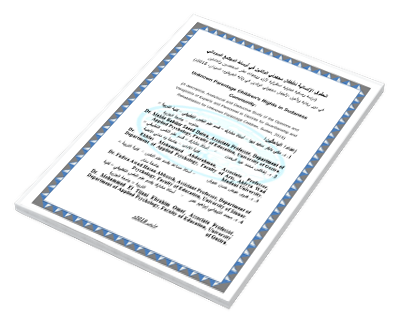Human rights of children of unknown parentage in Sudanese society (a descriptive, analytical and inductive study of the opinions and viewpoints of specialists and workers in care and rehabilitation homes for children of unknown parentage in Khartoum State, Sudan, 2018)
DOI:
https://doi.org/10.37376/fesj.vi7.662Keywords:
Human Rights, Children of unknown parentage, Sudanese Comuuninty, Khartoum State.Abstract
Children of unknown parentage have become one of the components of the community; such children have special social position in the community as a result of the distinctive social background they have. The study aimed at getting information about the extent to which unknown parentage children get access to human rights in the Sudanese community. The study adopted the descriptive method. A special questionnaire is designed as a means of data collection. A simple random and classified sample of (300) individuals including experts and workers in the field of guardianship and rehabilitation of children of unknown parentage in the state of Khartoum was chosen. The sample is divided according to gender i.e. (50%) for each sex. Data was analyzed by the Statistic Package for Social sciences (SPSS). Many results have been obtained: the T-test showed that children of unknown parentage enjoy their human rights in Sudanese community at a moderate level with the value (2.32), the degree of enjoying the (right to live) among these children is the highest in the Sudanese community with an average of (2.57), (equality before the law) has the average of (2.46), (the right to work) has the average of (2.34), (the right of education) has the average of (2.21), (freedom of speech) has the average of (1.31), and finally, (social security) has the average of (1.22). The study has also revealed that enjoying human rights in rural communities exceeds the one in urban communities according to the T-test (2.48). Children of unknown parentage who are brought up in institutions other than rehabilitation lodgings integrate in the community to a greater extent compared to their peers in rehabilitation lodgings. Interpretation of the future situation of children of unknown parentage is not clear in rural communities with T-test value (1.68). The study recommends the carrying out of cultural and social programmes for children of unknown parentage in collaboration with other related service institutions so as to attain more inclusion of children in real community. The study also recommends the establishment of a national fund for child protection particularly for children of unknown parentage in order to guarantee considerable, permanent and sufficient fund for child protection. The study has adduced many suggestions, among them is the suggestion that researches in human rights concerning children of unknown parentage in the Arab countries are to be compared with other countries so as to improve the situation of such children.
Downloads

Downloads
Published
How to Cite
Issue
Section
License
Copyright (c) 2021 Faculty of Education Scientific Journal

This work is licensed under a Creative Commons Attribution-NonCommercial-NoDerivatives 4.0 International License.














